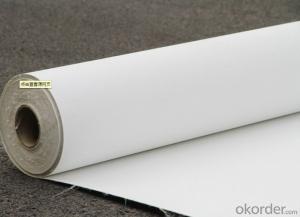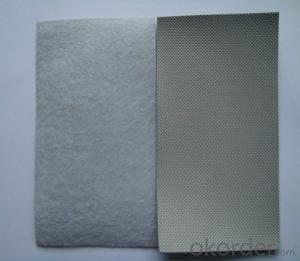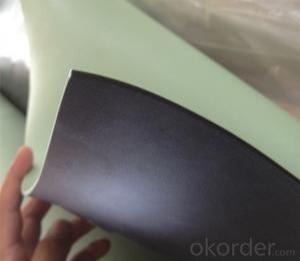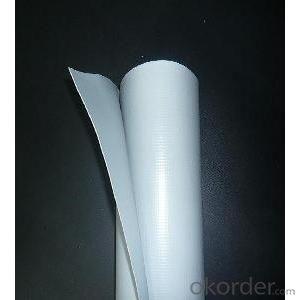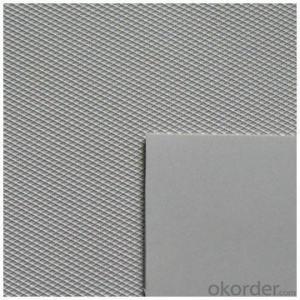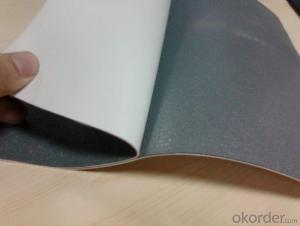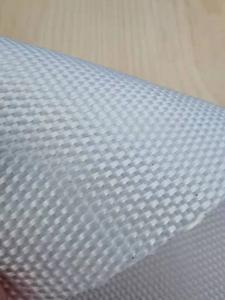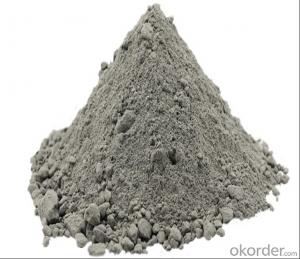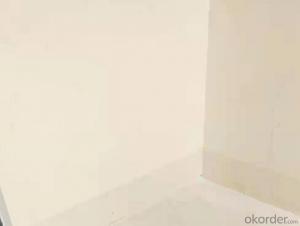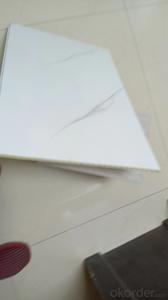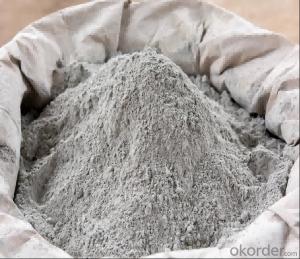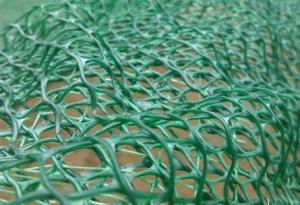PVC Waterproofing Membrane Reinforced Polyvinyl Chloride
- Loading Port:
- Shanghai
- Payment Terms:
- TT OR LC
- Min Order Qty:
- 20000 m²
- Supply Capability:
- 5000000 m²/month
OKorder Service Pledge
OKorder Financial Service
You Might Also Like
PVC Waterproofing Membrane Reinforced Polyvinyl Chloride
Product Description of PVC Waterproofing Membrane Reinforced Polyvinyl Chloride:
PVC waterproofing membrane is an excellent high-quality polymer waterproof sheet, made of PVC resin by adding plasticizer, anti-UV agent, anti aging agent, and stabilizer and other processing aids through extrusion and molding. As the highly recommended product by the Ministry of Construction, it is featured by high tensile strength, great elongation, good stability, small shrinkage, low-temperature performances, good resistance to weathering and root
penetration, and long service life.
Features of PVC Waterproofing Membrane Reinforced Polyvinyl Chloride:
1.Long service life and weathering resistance; and the materials can be used for 30 years on the roof and 50 years underground.
2. High tensile strength, great elongation, and small size change during heat treatment.
3. Good low temperature flexibility and adaptability to environmental temperature changes.
4. Good resistance to root penetration. It can be made for green roofs.
5. Excellent resistance to puncture and impact.
6. Convenient for construction (can be welded), solid and reliable, and Eco-friendly.
7. Strong resistance to chemical corrosion, suitable for special occasions.
8. Good plasticity, convenient and quick corner detail treatment. Easy maintenance and low cost.
9.After 2,000 hours of manual weathering verification
Classification of PVC Waterproofing Membrane Reinforced Polyvinyl Chloride:
1. N: Homogeneous PVC membrane
2. L: PVC membrane with fabric backing
3. W: Reinforced PVC membrane
Advantage of PVC Waterproofing Membrane Reinforced Polyvinyl Chloride:
1.) Mixing automation. Apply automatic temperature control automatic time control and automatic feed control.
2.) Extrusion equipment uses twin screw coextrusion. Screw temperature uses computer automatic temperature control system.
3.) Handpiece uses large width didhead extrusion equipment.
4.) Sophisticated three-roller calender equipment. The space between equiment is controlled by automation system.
Technical Data of PVC Waterproofing Membrane Reinforced Polyvinyl Chloride:
No. | Item | Model Ⅱ | |
1 | Tensile Strength Mpa ≥ | 12.0 | |
2 | Elongation at break% ≥ | 250 | |
3 | Shrinkage rate % ≤ | 2.0 | |
4 | Flexibility at low temperature | No crackle at -25oC | |
5 | Water tightness | Watertight | |
6 | Puncture resistance | Watertight | |
7 | Heat aging treatment | Appearance | Free from bubble, crack, cohesion and void |
Change rate of tensile strength % | +20oC | ||
Change rate of elongation at break | |||
Flexibility at low temperature | No crack at -20oC | ||
8 | Chemical corrosion resistance | Change rate of tensile strength % | +20 |
Change rate of elongation at break | |||
Flexibility at low temperature | No crack at -20oC | ||
9 | Artificial weathering | Change rate of tensile strength % | +20 |
Change rate of elongation at break | |||
Flexibility at low temperature | No crack at -20oC | ||
Application of PVC Waterproofing Membrane Reinforced Polyvinyl Chloride:
1) All kinds of roofs, such as steel structure roof, planted roof etc.
2) Underground engineering, such as building basement, subways, tunnels, air raid shelter, etc.
3) Other projects like artificial lake, dam, water reservoir, grain storehouse, etc.
Images of PVC Waterproofing Membrane Reinforced Polyvinyl Chloride:
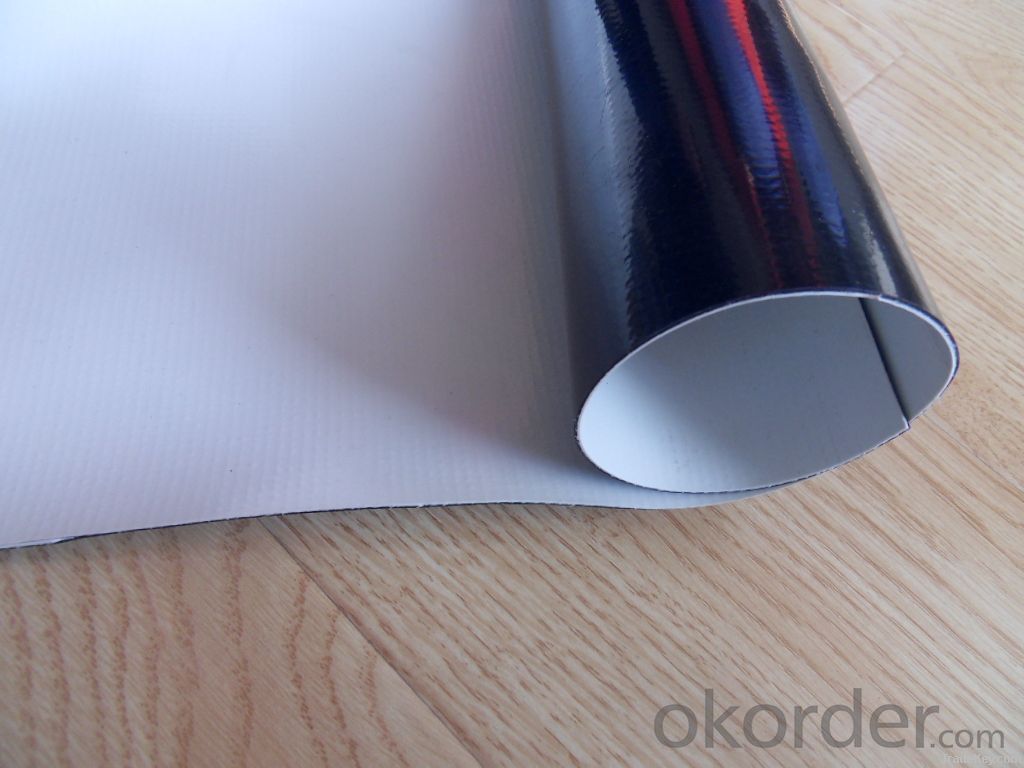
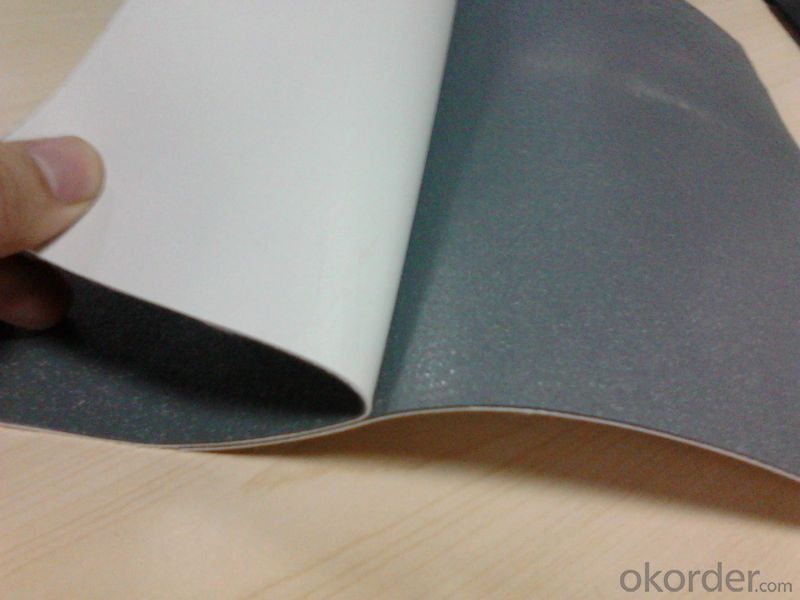
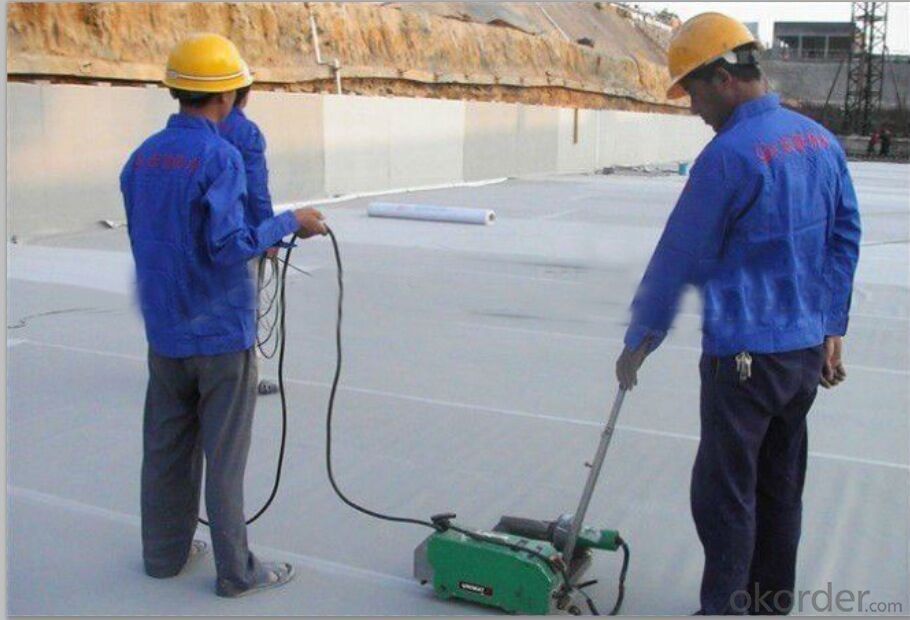
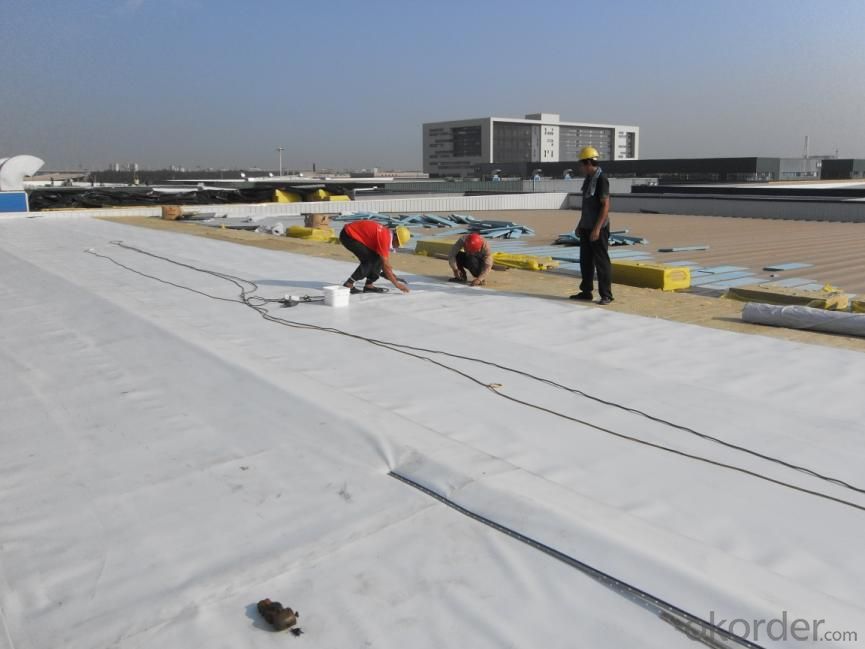
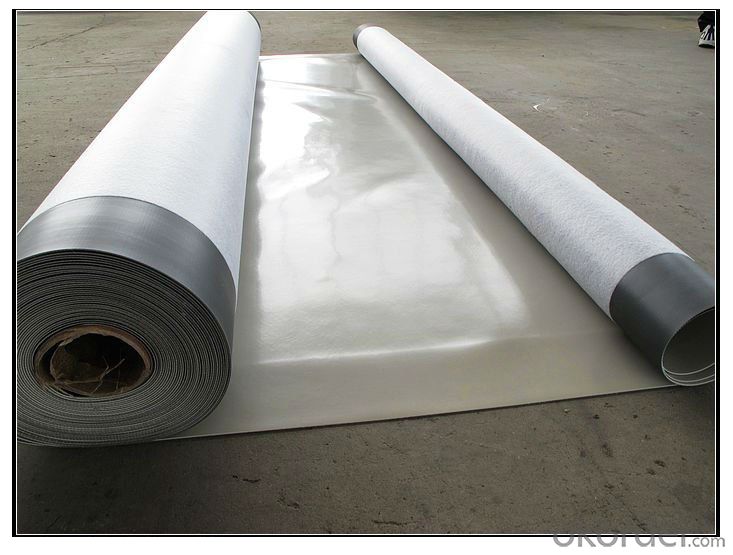
FAQ of PVC Waterproofing Membrane Reinforced Polyvinyl Chloride:
1. Can you produce 4m width?
Yes, no problem for us. We have four bases in China, largest one in this field.
2. How many quantity in one 20'' container for 1.2mm and 1.5mm?
480rolls, 11520m2 for 1.2mm and 400rolls, 9600m2 for 1.5mm
3. Can you provide free samples?
Yes, our samples are free, but express fees usually on buyer's account.
- Q:Can waterproofing membranes be used on green roofs?
- Indeed, green roofs can utilize waterproofing membranes. They serve as an indispensable element within green roof systems. The concept of green roofs involves a layer of plants and growing medium situated atop a waterproofing layer. It is this waterproofing layer that safeguards the building structure by preventing water infiltration and subsequent damage. The waterproofing membranes employed in green roof applications are specifically engineered to withstand the unique challenges posed by such installations, including exposure to water, UV radiation, and root penetration. These membranes are typically composed of durable materials such as PVC, TPO, or EPDM, renowned for their exceptional waterproofing capabilities. Moreover, certain waterproofing membranes used on green roofs may possess additional attributes like root resistance and UV stability, thereby ensuring the roof's longevity and imperviousness. Ultimately, the utilization of waterproofing membranes on green roofs plays a vital role in establishing a sustainable and enduring roofing system that not only provides water protection but also offers environmental advantages.
- Q:Are waterproofing membranes resistant to earthquake movements?
- Waterproofing membranes are designed to prevent the intrusion of water and moisture into structures, such as buildings and basements. While they are highly effective in protecting against water damage, they are not specifically designed to resist or withstand earthquake movements. Earthquakes involve the shaking and movement of the ground, which can exert significant forces on structures. Waterproofing membranes are not typically engineered to absorb or distribute these forces in the same way as seismic-resistant materials or building techniques. However, it is worth noting that some waterproofing systems may have a certain degree of flexibility or elasticity, which could potentially provide some resistance to minor ground movements during an earthquake. These properties may help the membrane to maintain its integrity and prevent water intrusion in the event of slight shifting or settling. Ultimately, when it comes to earthquake resistance, it is crucial to employ specialized seismic design principles and techniques that are appropriate for the specific location and building requirements. Waterproofing membranes should be used in conjunction with these seismic-resistant measures to ensure the overall structural integrity and safety of a building during seismic events.
- Q:Are waterproofing membranes resistant to impact damage?
- Waterproofing membranes offer protection against water infiltration and typically resist impact damage to varying degrees. The level of impact resistance depends on the specific membrane type and quality. Generally, high-quality waterproofing membranes are designed to endure normal impacts and stresses that occur during installation and use. They are manufactured using durable materials, like modified bitumen, rubberized asphalt, or synthetic polymers, which enhance their strength and resilience. Although waterproofing membranes can withstand minor impact damage, they are not completely impervious to more significant impacts. Dropping heavy objects or sharp objects falling onto the membrane can potentially cause punctures or tears, compromising the integrity of the waterproofing system. This can result in water infiltration and potential structural issues. To enhance impact resistance, additional protective measures can be taken, such as installing a protective layer or using reinforced membranes. These extra layers or reinforcements provide an additional barrier against impact damage, ensuring the long-term performance and durability of the waterproofing system. In conclusion, while waterproofing membranes generally resist impact damage, it is crucial to handle them with care during installation and avoid unnecessary impacts that could potentially compromise their integrity.
- Q:Are waterproofing membranes resistant to extreme weather conditions?
- Yes, waterproofing membranes are designed to be highly resistant to extreme weather conditions. They are engineered to withstand heavy rain, snow, high winds, and temperature fluctuations without compromising their effectiveness. They provide a durable barrier against moisture, protecting structures from water damage, leaks, and potential structural issues caused by extreme weather.
- Q:Can a waterproofing membrane be used for sewage treatment plants and wastewater facilities?
- Yes, a waterproofing membrane can be used for sewage treatment plants and wastewater facilities. These facilities require a high level of protection against water infiltration and leakage, as they deal with large volumes of wastewater and chemicals. A waterproofing membrane can provide a seamless and impermeable barrier to prevent water from entering or exiting the structure, ensuring the integrity of the facility and preventing contamination of surrounding areas. Additionally, a waterproofing membrane can also protect the facility's infrastructure from the corrosive effects of wastewater and chemicals, prolonging its lifespan and reducing maintenance costs. Therefore, utilizing a waterproofing membrane is a crucial component in the construction and maintenance of sewage treatment plants and wastewater facilities.
- Q:Can a waterproofing membrane be used for an industrial facility?
- Yes, a waterproofing membrane can be used for an industrial facility. It provides a protective barrier against water intrusion, preventing potential damage and ensuring the integrity of the facility's structure.
- Q:Are waterproofing membranes resistant to water vapor transmission?
- Yes, waterproofing membranes are resistant to water vapor transmission. These membranes are designed to create a barrier that prevents water from penetrating through them. They are typically made from materials that are impermeable to water, such as rubber, plastic, or bitumen. This means that they effectively block the passage of liquid water, preventing it from seeping into the underlying structure. However, it is important to note that while waterproofing membranes can effectively resist water vapor transmission, they may not completely eliminate it. Some amount of water vapor may still pass through the membrane, but it is significantly reduced compared to other materials that are not designed for waterproofing purposes.
- Q:Construction Measures for Waterproof Coil in Winter
- 3. Do the seam and the end of the handle. In order to improve the reliability of the winter construction, to prevent the waterproof layer after the hot-melt paving seam with the possibility of seaming, requiring the mouth and the end of the mouth are sealed with sealing material to improve the waterproof impermeability.
- Q:Can a waterproofing membrane be used in conjunction with warranty or insurance policies?
- Yes, a waterproofing membrane can typically be used in conjunction with warranty or insurance policies. Many waterproofing products and systems come with warranties that provide coverage for a certain period of time, typically ranging from 5 to 20 years or more. These warranties often guarantee the effectiveness and durability of the waterproofing membrane, and may cover repairs or replacements in case of any failures or defects. Additionally, insurance policies may also provide coverage for damages caused by water leaks or flooding. By installing a waterproofing membrane, property owners can mitigate the risk of water damage and potentially reduce their insurance premiums. It is advisable to check with your insurance provider to determine if they offer any discounts or incentives for using waterproofing systems. However, it is important to note that the coverage provided by warranties and insurance policies may vary depending on the specific terms and conditions. It is recommended to carefully review the details of the warranty or insurance policy and consult with professionals to ensure that the waterproofing membrane meets the requirements and specifications outlined by these agreements.
- Q:Can a waterproofing membrane be used for plant rooms and mechanical equipment areas?
- Plant rooms and mechanical equipment areas can benefit from the use of a waterproofing membrane. It is necessary to waterproof these areas in order to safeguard the equipment and surrounding structures against water damage. A waterproofing membrane serves as a commonly implemented solution for this purpose. By forming a barrier, it effectively prevents water infiltration into the plant rooms and mechanical equipment areas, thereby ensuring the equipment remains dry and protected. Moreover, this membrane aids in averting moisture-related problems like the growth of mold and mildew, which can be detrimental to both the equipment's functionality and the overall operation of the plant room. Ultimately, incorporating a waterproofing membrane in plant rooms and mechanical equipment areas proves to be a dependable and efficacious approach for maintaining the longevity and performance of the equipment and structures.
1. Manufacturer Overview |
|
|---|---|
| Location | |
| Year Established | |
| Annual Output Value | |
| Main Markets | |
| Company Certifications | |
2. Manufacturer Certificates |
|
|---|---|
| a) Certification Name | |
| Range | |
| Reference | |
| Validity Period | |
3. Manufacturer Capability |
|
|---|---|
| a)Trade Capacity | |
| Nearest Port | |
| Export Percentage | |
| No.of Employees in Trade Department | |
| Language Spoken: | |
| b)Factory Information | |
| Factory Size: | |
| No. of Production Lines | |
| Contract Manufacturing | |
| Product Price Range | |
Send your message to us
PVC Waterproofing Membrane Reinforced Polyvinyl Chloride
- Loading Port:
- Shanghai
- Payment Terms:
- TT OR LC
- Min Order Qty:
- 20000 m²
- Supply Capability:
- 5000000 m²/month
OKorder Service Pledge
OKorder Financial Service
Similar products
New products
Hot products
Related keywords
